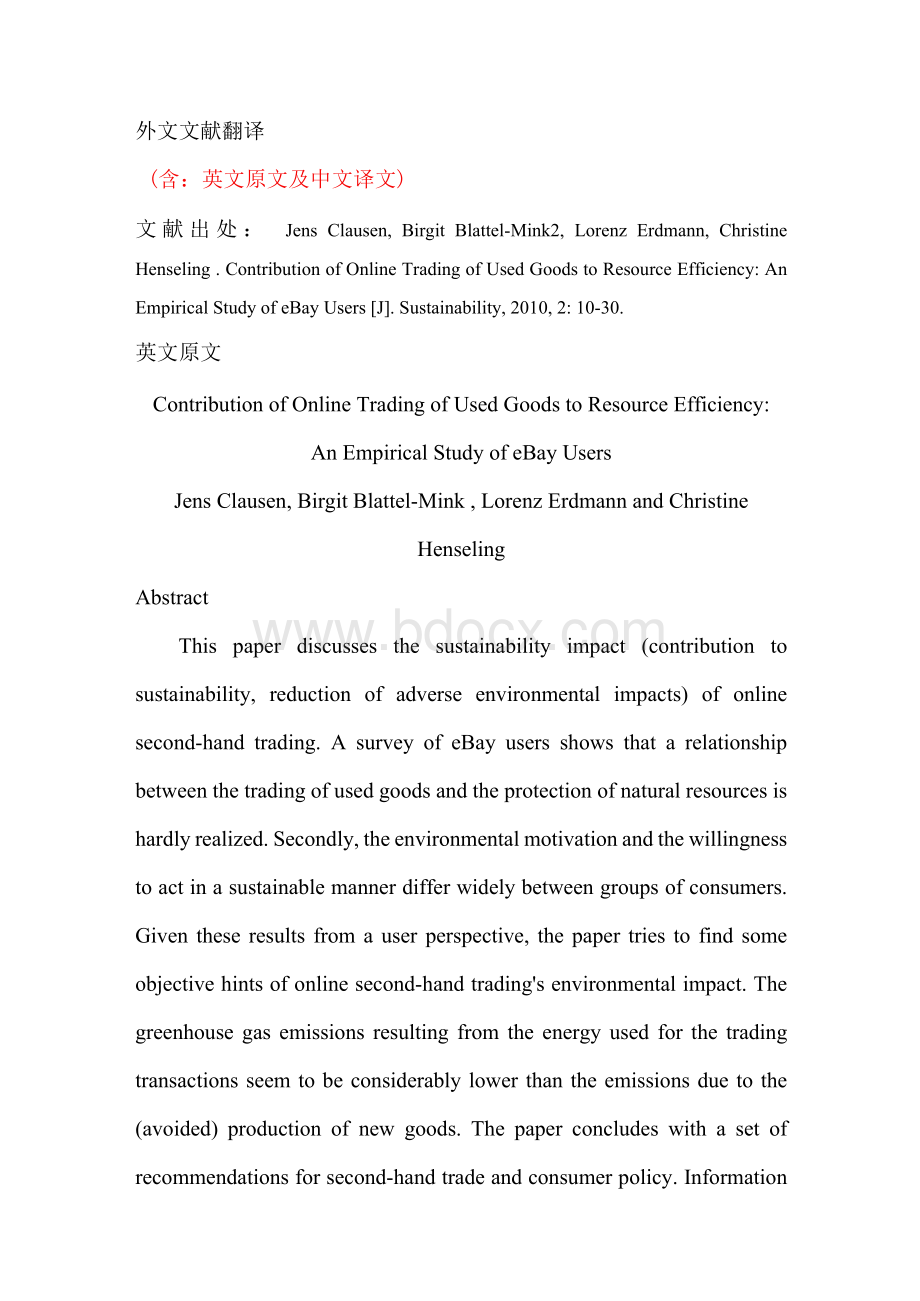二手物品交易网站外文文献翻译中英文.docx
《二手物品交易网站外文文献翻译中英文.docx》由会员分享,可在线阅读,更多相关《二手物品交易网站外文文献翻译中英文.docx(15页珍藏版)》请在冰豆网上搜索。

外文文献翻译
(含:
英文原文及中文译文)
文献出处:
JensClausen,BirgitBlattel-Mink2,LorenzErdmann,ChristineHenseling.ContributionofOnlineTradingofUsedGoodstoResourceEfficiency:
AnEmpiricalStudyofeBayUsers[J].Sustainability,2010,2:
10-30.
英文原文
ContributionofOnlineTradingofUsedGoodstoResourceEfficiency:
AnEmpiricalStudyofeBayUsers
JensClausen,BirgitBlattel-Mink,LorenzErdmannandChristine
Henseling
Abstract
Thispaperdiscussesthesustainabilityimpact(contributiontosustainability,reductionofadverseenvironmentalimpacts)ofonlinesecond-handtrading.AsurveyofeBayusersshowsthatarelationshipbetweenthetradingofusedgoodsandtheprotectionofnaturalresourcesishardlyrealized.Secondly,theenvironmentalmotivationandthewillingnesstoactinasustainablemannerdifferwidelybetweengroupsofconsumers.Giventheseresultsfromauserperspective,thepapertriestofindsomeobjectivehintsofonlinesecond-handtrading'senvironmentalimpact.Thegreenhousegasemissionsresultingfromtheenergyusedforthetradingtransactionsseemtobeconsiderablylowerthantheemissionsduetothe(avoided)productionofnewgoods.Thepaperconcludeswithasetofrecommendationsforsecond-handtradeandconsumerpolicy.Informationaboutthesustainabilitybenefitsofpurchasingsecond-handgoodsshouldbeincludedingeneralconsumerinformation,andargumentsforchangesinbehaviorshouldbetargetedtodifferentgroupsofconsumers.
Keywords:
onlinemarketplaces;onlineauctions;consumer;electroniccommerce;usedproducts;second-handmarket;sustainableconsumption
1. Introduction
Onlineauctionandtradingplatformsareincreasingtheopportunitiesforsustainableconsumption.Thepotentialofonlinebasedsecond-handtradinglieslargelyintheopportunitytoextendthelifespanofproducts,therebyavoidingadditionalenvironmentalstressesduetothepurchaseofnewgoods.Todate,privatehouseholdsoftenfailedtoexploitthepotentialsforreusingproductsbecauseofhightransactioncosts.Tradeinsecond-handgoodsremainedlimitedtoregionalmarkets.Thesebarriersfrequentlypreventedlocalandregionalusedgoodsmarketsfromattainingcriticalmassandbecomingattractiveforbothbuyersandsellers.Inrecentyears,however,rapidlyincreasinguseoftheInternetandtradingplatforms,suchaseBay,havefundamentallytransformedtheunderlyingconditionsofsuchmarkets.
Onlinemarketshavenotonlysignificantlyincreasedthenumbersofmarketparticipants;theyhavealsochangedtherolestraditionallyassignedtoconsumersandproducers.Exchangesites,auctionplatformsandotherInternet-basedtradingmodelswhereusersarenotmerelybuyers,butatthesametime,alsoactivesellersofproductsorservices,haveshiftedtheroleofconsumers.
Againstthisbackground,thisarticleexaminesconsumptionprocessesusingtheexampleofeBay,theworld'slargestonlinetradingplatformforusedgoods,byfocusingonthefollowingquestion:
Whichsustainabilitypotentialsareconnectedwiththeelectronictradingofusedgoods,andhowcanthesepotentialsbeexploited?
Thisquestionliesinthecenteroftheresearchproject"FromConsumertoProsumer一Developmentofnewtradingmechanismsandauctionculturestopromotesustainableconsumption.,^Theprojectisintentionallylinkedwithvariousstreamsofresearchandinsights,especiallyconcerningtheintensificationofuse,lifestyleresearch,andlife-cycleassessment,inthefieldsofinformationtechnologyandtelecommunications,andintegratesthemfromtheperspectiveoftheresearchguidingquestion.
Aftergivinganoverviewofthescientificworkonenvironmentalattitudesandbehaviorinthecontextofinternetbasedusedgoodstrading,andanempiricallookoninternetusageinChapter2,theempiricalresultsofanonlinesurveyononlinetradingandsustainabilityarepresentedinChapter3.Chapter4drawsconclusionsfromtheempiricalstudyandChapter5focusesontheecologicalassessmentofusedgoodstrading.Thepaperconcludeswithsomeremarksontheconsequencesofsecond-handtrade,onlineplatforms,andconsumerpolicy.
2. Internet-BasedUsedGoodsTradingfromaSubjectivePerspective
Sustainabilityresearchersinthesocialsciencesassumethatenvironmentally-orientedbehaviorissupportedtoanon-negligibledegreebypositiveattitudestowardtheenvironmentandbyknowledgeabouttheenvironment[1-7].Timeandagain,however,representativesurveysofthepopulationprovideevidenceforadiscrepancybetweenconcernaboutincreasingenvironmentaldevastationanditsconsequences,aswellasknowledgeabouttheenvironmentontheonehand,andenvironmentalbehaviorthatisinlinewithsuchknowledgeontheother.Itispossibletoidentifygroupsofindividualswhodisplayenvironmentally-friendlybehavior,butnotthecorrespondingattitud